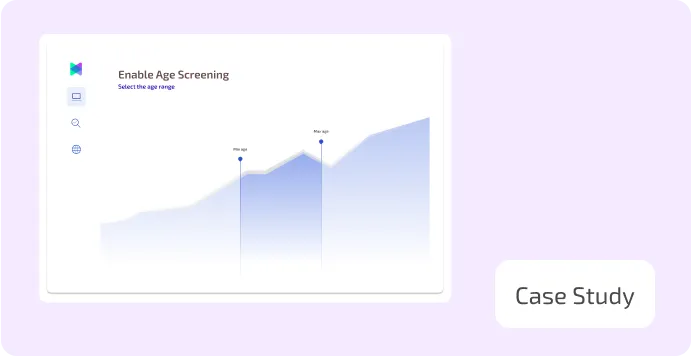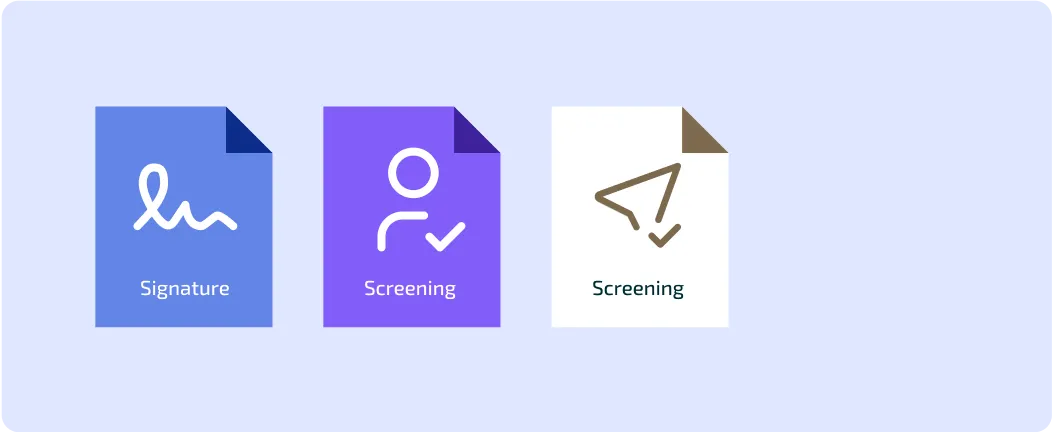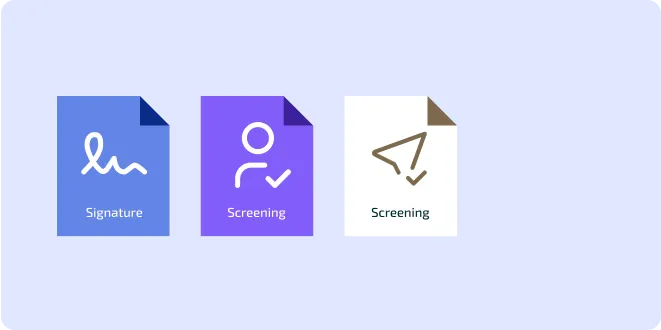.webp)
Published on
March 18, 2025
Anti-Money Laundering Laws in Qatar: An Overview in 2025
In this story

Accelerate AML Compliance: Meet Regulatory Demands with 80% Less Setup Time
.svg)
.svg)
Qatar's commitment to combating money laundering and terrorist financing is reflected in the anti-money laundering laws in Qatar. These laws and regulations, rooted in State Law No. (20) of 2019; play a key role in the financial system and legal framework, aiming to detect and prevent illicit financial activities.
Qatar has actively strengthened its AML and CFT regulations in recent years, aligning them with international standards. This commitment is evident in the country's efforts to update and refine its regulatory framework periodically. In this blog, we will explore anti-money laundering laws in Qatar.
Money Laundering Explained
Money laundering is a process where individuals hide illegally acquired funds to make them seem legal. This involves distinct stages of money laundering, including placement, layering, and integration.
You might be wondering how the stages of money laundering work. In the placement stage, illicit funds are introduced into the financial system. During layering, the money is moved around, and transactions are conducted to confuse the audit trail. Finally, in the integration stage, the "cleaned" money is re-introduced into the economy, making it challenging for authorities to trace the illegal origin.
Qatar's Anti-Money Laundering Efforts
Qatar has shown commendable efforts in enhancing its capabilities to combat money laundering and terrorism financing, aligning well with FATF requirements and recommendations. Despite its small size and affluence, the country faces potential risks from activities like smuggling and terrorism financing. Qatar is aware of these challenges and is actively working to better understand complex illicit activities.
The implementation of a risk-based approach in the financial sector is a positive step, with ongoing improvements in supervising the non-financial sector. Notably, progress has been made in collecting beneficial ownership information for its unified register, although there is a need for continued focus on accuracy.
Qatar's financial intelligence unit is well-equipped, and there's room for further utilization of its sophisticated analysis capabilities to identify instances of money laundering and terrorism financing. The strong implementation of anti-money laundering laws in Qatar underscores the nation's commitment to combating financial crimes and ensuring a secure financial environment.
Comply quickly with local/global regulations with 80% less setup time
.svg)
.svg)
AML Regulatory Framework in Qatar
The regulatory framework in Qatar involves multiple authorities and institutions working together to enforce AML measures. Here are some key aspects:
1. Legal Framework
The legal framework in Qatar provides the foundation for the country's governance and regulation across various sectors, including finance, commerce, and social matters. The primary legislation governing anti-money laundering laws in Qatar is Law No. (20) of 2019 on Anti-Money Laundering and Combating the Financing of Terrorism.
2. International Collaboration
Qatar actively collaborates with international organizations and is a member of MENAFATF (Middle East and North Africa Financial Action Task Force), following international best practices recommended by the Financial Action Task Force (FATF).
3. Regulatory Authority
The Qatar Financial Information Unit (QFIU) takes charge of overseeing AML efforts. The QFIU is the national center that gets and looks at reports about suspicious transactions from banks and other businesses. It also analyzes information about money laundering in Qatar, terrorism financing, and related crimes. QFIU works closely with national authorities and wants to have a good relationship with businesses and organizations to share information about suspicious transactions.
Roles and Functions of QFIU
- Receive: QFIU gets reports about suspicious transactions as required by the anti-money laundering laws in Qatar.
- Analyze: It checks and decides what to do with the reports, working together with reporting entities and national authorities.
- Disseminate: QFIU shares the analysis results with national authorities like the Public Prosecution and the Ministry of Interior.
Key Aspects of AML Regulations in Qatar
1. Customer Due Diligence (CDD)
Financial institutions and designated businesses in Qatar conduct due diligence when establishing relationships, including identifying and verifying customers. Ongoing monitoring of transactions for suspicious activities is a crucial component.
2. Appointing MLRO and DMLRO
Designated businesses in Qatar are mandated to appoint a Money Laundering Reporting Officer (MLRO) and a Deputy MLRO.
3. Suspicious Transaction Reporting
Mandatory reporting of suspicious transactions to the QFIU is a vital aspect of Qatar's AML framework, contributing significantly to the detection and prevention of money laundering in Qatar and terrorist financing activities.
4. Record-Keeping
Firms operating in Qatar and the QFC must retain customer due diligence (CDD) records, including identification documents, sanctions screening evidence, account files, and transaction analysis, for at least ten years after the business relationship ends.
As per anti-money laundering laws in Qatar, these records, whether electronic or hard copy, should be comprehensive enough to facilitate quick compliance with information requests from Competent Authorities and support the reconstruction of individual transactions for potential legal purposes.
5. Continuous Training and Awareness
To foster a culture of compliance, financial institutions, and designated businesses are required to provide ongoing training to employees. This ensures awareness of AML and CFT regulations and the ability to recognize suspicious activities.
6. Penalties
Non-compliance with anti-money laundering laws in Qatar may result in penalties, including fines, imprisonment, or the revocation of licenses for financial institutions and designated businesses.
The AML/CFT Section imposes penalties, including warnings, financial fines, powers restriction, license suspension, and registration revocation, determined by the gravity of the violations.
Challenges in Implementing AML Measures in Qatar
Renowned for its strategic location, unique position, and strong financial landscape, Qatar encounters specific challenges related to money laundering that align with its prominent role in the global financial arena.
1. Complex Financial Transactions
The evolving nature of financial transactions poses a challenge, with increasingly sophisticated methods used by money launderers. Staying ahead of these complexities requires continuous adaptation of AML measures.
2. Global Regulatory Changes
Adapting to frequent changes in global AML regulations and standards, including updates from international bodies like the Financial Action Task Force (FATF), can be challenging.
3. Technology and Cyber Risks
The rise of digital financial services and the use of technology in transactions present challenges in monitoring and identifying potential money laundering activities. Cybersecurity threats add an additional layer of complexity.
4. Cross-Border Transactions
Qatar's international business environment involves cross-border transactions, increasing the complexity of monitoring and regulating financial activities.
5. Beneficial Ownership Transparency
Despite efforts to collect beneficial ownership information, maintaining accurate and up-to-date records remains challenging.
According to anti-money laundering laws in Qatar, the beneficial owner is the natural person ultimately owning or controlling a customer, whether through ownership interest, voting rights, or by conducting transactions on their behalf.
6. Training and Awareness
Continuous training and awareness programs are necessary to keep professionals in the financial and non-financial sectors updated on AML measures.
7. Integration of Non-Financial Sectors
While progress has been made in the financial sector, integrating effective AML measures into non-financial sectors, such as legal and professional services, poses a challenge.
8. International Cooperation
Enhancing international cooperation and information-sharing mechanisms is vital for addressing cross-border money laundering threats. Collaborating with other countries and organizations requires continuous efforts to strengthen partnerships.
9. Legal Framework and Enforcement
Ensuring that the legal framework is comprehensive and strong is important. Additionally, effective enforcement of anti-money laundering laws in Qatar and penalties for non-compliance are essential components in deterring illicit financial activities.
10. Resource Allocation
Adequate allocation of resources, both financial and human, is crucial for the effective implementation of AML measures. Insufficient resources may hinder the ability to carry out comprehensive monitoring and enforcement.
How Can FOCAL Help?
Businesses aiming to comply with Anti-Money Laundering laws in Qatar can leverage AI-powered platforms like FOCAL to enhance their AML compliance efforts. Here's how businesses can utilize FOCAL AML compliance platform and its features to comply with AML regulations:
- Customer Due Diligence (CDD): FOCAL streamlines the customer due diligence process by automating Customer Screening and Customer Risk Scoring. This ensures accurate and efficient onboarding of clients while adhering to AML regulations. Learn how FOCAL platform enabled Aseel to experience an 87% reduction in onboarding time, with the average onboarding now taking only 40 seconds.
- Risk Assessment: FOCAL assists in conducting comprehensive risk assessments by analyzing various factors, including transaction history, customer behavior, and external data sources. This helps businesses categorize clients based on their risk level and allocate resources accordingly.
- Case Management: FOCAL enables businesses to prioritize, investigate, and manage cases efficiently. Automated case management features can streamline the workflow, ensuring a timely and organized response to alerts.
- Regulatory Compliance Updates: FOCAL stays updated with the latest AML regulations and automatically implements necessary changes to ensure ongoing compliance. This feature is crucial in a dynamic regulatory landscape, such as Qatar's, where compliance requirements may evolve.
- Machine Learning for Pattern Recognition: Leveraging machine learning capabilities, FOCAL identifies complex patterns indicative of money laundering activities.
- Documentation and Reporting: FOCAL assists in automating the documentation process required for regulatory reporting. This ensures accuracy and completeness in compliance reporting, reducing the risk of errors.
- Continuous Monitoring and Adaptive Learning: FOCAL provides continuous monitoring of transactions and activities, adapting and learning from new data.
- Integration with Existing Systems: FOCAL can seamlessly integrate with existing business systems, ensuring a cohesive approach to compliance without disrupting regular operations.
Conclusion
In conclusion, given the dynamic nature of anti-money laundering laws in Qatar, designated businesses and individuals in Qatar are encouraged to stay updated with the latest requirements. Consulting regulatory authorities such as the Qatar Central Bank (QCB) or the Qatar Financial Centre Regulatory Authority (QFCRA) and seeking legal advice from qualified professionals familiar with Qatar's financial regulatory landscape is advisable for the most current information.
FAQs
Q1. What are the main requirements for financial institutions and businesses in Qatar?
Financial institutions and businesses in Qatar must adhere to AML regulations, conduct customer due diligence, and report suspicious transactions.
Q2. What are the consequences of violating AML laws in Qatar?
Violating AML laws in Qatar can lead to severe penalties, including fines and legal actions, to ensure compliance and deter illicit financial activities.
Q3. How to Identify a Suspicious Transaction?
Look for unusual patterns, large transactions without apparent purpose, or transactions inconsistent with the customer's profile. Any deviation from the norm should raise suspicion.
Q4. When to Submit the STR?
QFIU's Suspicious Transaction Report (STR) Guidance specifies that if there is a suspicion, the financial institution must submit the STR within 24 hours of determining the transactions' suspicious nature. Reporting entities must promptly submit STRs to QFIU, with post-transaction reports submitted within three working days and terrorism-related suspicions within 24 hours.
Streamline Compliance: Achieve 80% Faster Setup for Fraud Prevention
.svg)
.svg)

How Aseel reduced onboarding time by more than 87% using FOCAL
Learn how FOCAL empowered Aseel to achieve new milestones.
.svg)
.svg)
Mastering Fraud Prevention: A Comprehensive Guide for KSA and MENA Businesses
51% of organizations fell victim to fraud in the last two years, don't be caught off guard, act proactively.
.svg)
.svg)
Featured blog posts
.svg)





AI-Driven Precision in Fraud Risk and AML Compliance
.svg)
.svg)

.svg)
.png)






.webp)




.svg)








%20(1).webp)
Comments
Leave a Reply
Comment policy: We love comments and appreciate the time that readers spend to share ideas and give feedback. However, all comments are manually moderated and those deemed to be spam or solely promotional will be deleted.